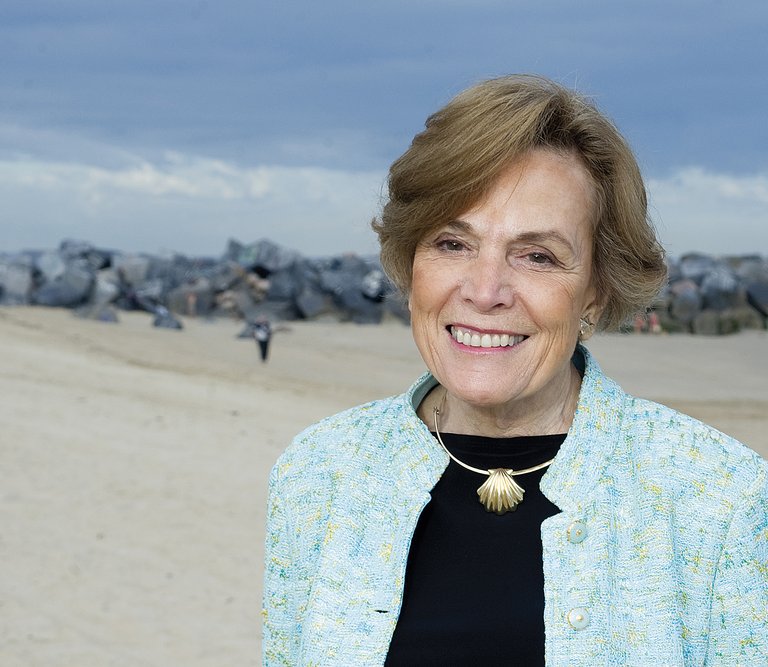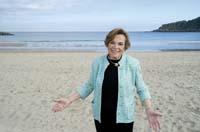"Anyone can catch the mask and dive into the water, and he will see things that will make him change his way of thinking"

When I started diving, in the 1950s I was one of the first people to use a diving team in my country, United States. And one of the first to live under water, I have done it nine times. And I have used more than 30 types of submarines. None of them existed. before the middle of the century.
New technologies are allowing us to see what we could not see so far. For example, when I was a child, we did not know that in the Atlantic, Pacific and Indian Ocean there were mountain ranges; we were not aware that the oceans lead to climate and time.
Now we understand that the ocean is indispensable for all life on Earth, and of course for our life. We have also understood for the first time our ability to modify the oceans through what we launch and extract from them. Thus, in a few years we have seen how the coral reefs have fallen (half have already disappeared or are in a critical situation) and that 90% of the big fish have disappeared, because we are very good finding them, catching them and eating them.
We have better maps of the Moon, Mars and Jupiter than those of our planet, especially in the case of the ocean. It is absurd that only 5% of the ocean maps are as accurate as those of the Moon and those of Mars. Not acceptable. We need to understand that part of the Solar System, that part of the universe. It is our home! Our only house!
Perhaps one day we will send ambassadors to live on Mars. I would like to try, but we will not lead to seven billion. We will surely have enough work sending ten people to Mars and living there.
The change observed in the oceans is the most fascinating thing I have seen in the oceans. I like to go inside the ocean in submarines, as I get down below that keeping my breath or using diving equipment. With diving equipment, you know, I can get up to about 50 meters and that's a lot. With the submarines I can also go down four kilometers.

Because when you are on the surface, in open sea, the water is transparent and blue. And as we go down, the blue becomes more intense, more intense, and is filled with a multitude of nuances, there are all the colors you can imagine attached to the blue... And it becomes darker, darker and reaches the dark blue, almost purple.
When looking up, however, you still see the upper light; when you are 500 meters away, you can still know which is the top and bottom. But it is very dark at all times. The exception is the light of living beings, whose living beings are able to generate light like fireflies. 90% of the living creatures of the deep sea can generate light in the form of flash, sparks or flashes. It's very nice, it looks like you're in a galaxy full of stars when you get into the dark side of the ocean.
People want to climb up the sky, be astronauts, discover new and curious ways of life on other planets, and we don't realize that the most amazing ways of living are there [pointing to the sea]! Anyone can touch the mask and dive into the water and see things that will make him change his way of thinking. My mother did it at the age of 81 and when she came out she said no one should wait at 81 to see him. The ocean is to explore, to look with new eyes.
The most terrible thing I have seen in the ocean is the damage caused by destructive fishing. For example, trawling fishing boats and dredges have reduced the seabed, and where formerly there were sponges, corals and associated fish there is nothing. Goodbye! It is evident.
Using these destructive resources to trap wildlife in the oceans is not a good way to feed. In addition to fish, they destroy the entire seabed and everything related to the bottom. I have seen long old fishing lines thrown like lost waste in the ocean, tangled with savages. It breaks my heart to see to what extent we can damage something that is fundamental to our life. I think the ocean is the blue heart of the planet. We must take care of our heart and not destroy it.
We have to take care of the natural system: forests, hydrological basins, rivers... wildlife. And not because it is a luxury, nor an opportunity, but because it is essential for our life. In short, our life is linked to systems that provide us with oxygen; 70% of the oxygen we breathe comes from the ocean, through small green and blue-green living beings found in the sea. They produce oxygen and trap carbon. They are part of the carbon cycle, the oxygen cycle, the complete water cycle. Part of everything that keeps us alive!

We didn't know it 100 years ago, nor 50 years ago. Also at this time many people have not been aware that we know more and more about the influence of the ocean on every breath we do, on every drop of water we drink.
They are solutions to supply the sweet water necessary for human consumption. These plans are a way to address the issue, but they require a lot of energy. Meanwhile, we could keep the water available, protect the hydrological basins, and not spend the resources we already have.
The plans for desalination are more and more, to the extent that we too are more. And those plans also have influence: every time the water of the oceans enters not only water. Life in the oceans also goes in that water. If you take a bucket of water, you can enjoy living beings of twelve categories that make the ocean work. More than stones and water are those that make it possible for the planet to function; they are stones, water and life.
At the moment we are not correctly using fresh water. I'm sure there are better ways to catch the ocean water and turn it into fresh water and salt, and destroy life on the way. We are still in time to find how to resist. We are at the most decisive moment for survival, since the decisions we make now, which we will make in the next ten years, will affect the next 10,000 years.
Now is the time to launch good intentions, focus technology towards better energy solutions, develop new solutions for water, use and care for this magical blue planet, the only house we have. Now we have a unique and perhaps unique opportunity.
Buletina
Bidali zure helbide elektronikoa eta jaso asteroko buletina zure sarrera-ontzian











